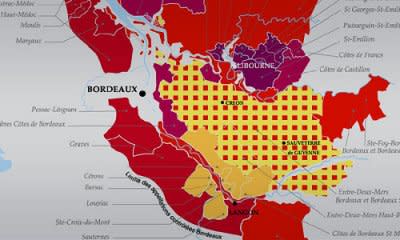Do you speak French (wine)?

by Sheri Sauter Morano, Master of Wine; for Lot18
A friend recently forwarded me an old Dave Barry column about his experience at a rather pretentious wine dinner. The article was pretty funny, but one part really struck me. He happened, that evening, to find himself seated next to a French woman and he asked her if French people talk about wine the same way that Americans do. She told him that in France, there is less talking and more drinking. I think the French have a certain je ne sais quoi - and it isn't just due to their ability to accessorize (I'm still trying to figure out where French women learn all of their scarf-tying secrets) or avoid being, as they say, gauche. It's that they don't spend as much time worrying about their wine.
Love French wines? Check out Lot18 and enjoy $15 off your first order!
American wine lovers often tell me that they find French wine intimidating, hard to understand and difficult to pronounce. I think the general issue is that we don't speak the same language - and I am not just talking literally here. But there are two aspects of this problem that have always bugged me. First off, the pronunciation issue. I have next to no ear for languages. Yes, I wish that was different, but I don't let it stop me when it comes to wine and nor should you. If you don't speak the language, why should you feel overly ashamed if you mispronounce something? Naturally, we'd all like to get it right - I don't know anyone whose goal is to get it wrong. But what I would like to know is why is it cute when someone with a French or Italian accent mispronounces an American term but not the other way around? While I think we should all try our best to nail those hard-to-say wine words, I'd like to see a little less stress around the subject.
My second issue? It has to do with the different languages we speak when it comes to how wines are "named." Most French wines are not named for the main grape variety, but for the region the wine comes from. Americans are a lot more familiar with grape varieties - think Cabernet Sauvignon, Merlot or Chardonnay - than places. Given that little time in the average American classroom is devoted to geography - much less the intricacies of French geography, I can fully appreciate that this does get confusing. That's one reason there are people, I'm one of them, who spend their whole lives studying this stuff - cause it can take that long to learn it all. But remember, it's like cooking - just because you aren't a Julia Child doesn't mean you can't throw together a delicious meal.
And Julia Child herself is a great example. Here's someone who took one of the more complicated subjects - French cooking - and translated it into a language we could understand (and she showed us how to have some fun in the process). Maybe Boeuf Bourguignon sounds complicated, but once you know it's essentially a wine-based beef stew, it all makes sense. In the end, it all boils down to the fact that sometimes we can all benefit from a translator (and that elusive scarf-tying guide). So to help you out on this front, here's a quick overview of some of the major wine regions in France in American grape-speak. Feel free to tuck it in your pocket for consulting the next time you are faced with a language barrier.
Region & Major Grapes
Alsace: White wines from Riesling, Pinot Gris, Pinot Blanc, Muscat and Gewürztraminer, some reds from Pinot Noir
Beaujolais: Reds from Gamay grape, some whites from Chardonnay
Bordeaux: Reds typically blend of Cabernet Sauvignon, Merlot and Cabernet Franc. Whites and sweet wines made from a blend of Sauvignon Blanc and Semillon
Burgundy: Pinot Noir for reds and Chardonnay for whites
Champagne: Sparkling wines made from Pinot Noir, Pinot Meunier and Chardonnay
Languedoc-Roussillon: Wide variety, reds include Grenache, Syrah, Carignan, Cinsault, Mourvèdre, Cabernet Sauvignon and Merlot. Whites from Chardonnay, Sauvignon Blanc and Viogner
Loire: Whites from Muscadet, Chenin Blanc and Sauvignon Blanc. Reds from Cabernet Franc, Pinot Noir, Cot and Gamay
Provence: Famous for dry French rosés, typically blend of Grenache, Carignan, Cinsault, and Syrah
Rhône: Syrah, Grenache, Carignan, Cinsault and Mourvèdre for reds and Viognier, Marsanne and Roussanne for whites
South West: Cabernet Sauvignon, Cabernet Franc, Merlot, Malbec and Tannat for reds. White grapes include Sauvignon Blanc, Ugni Blanc, Colombard, Semillon, Manseng and Mauzac
